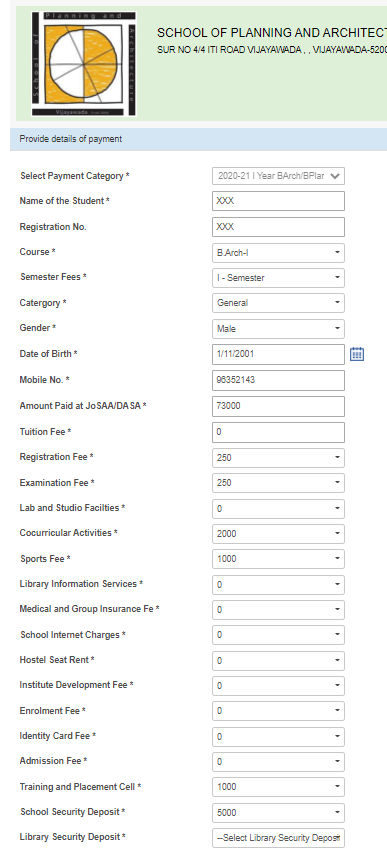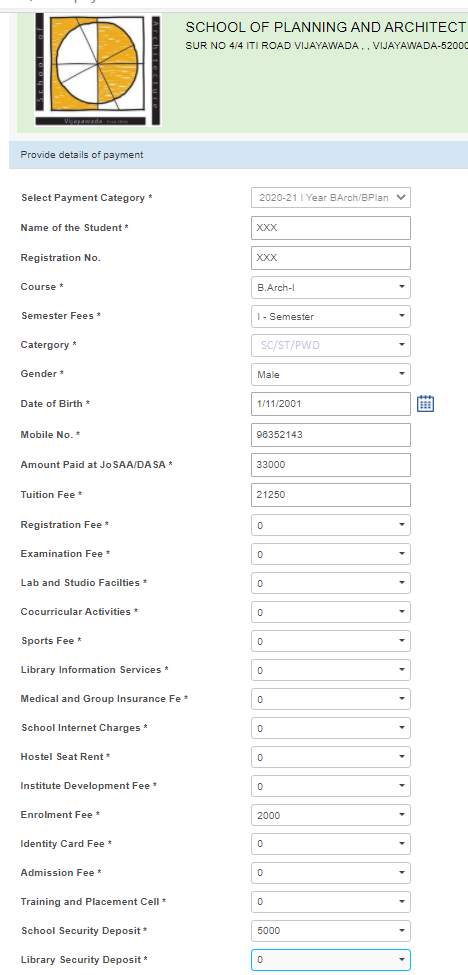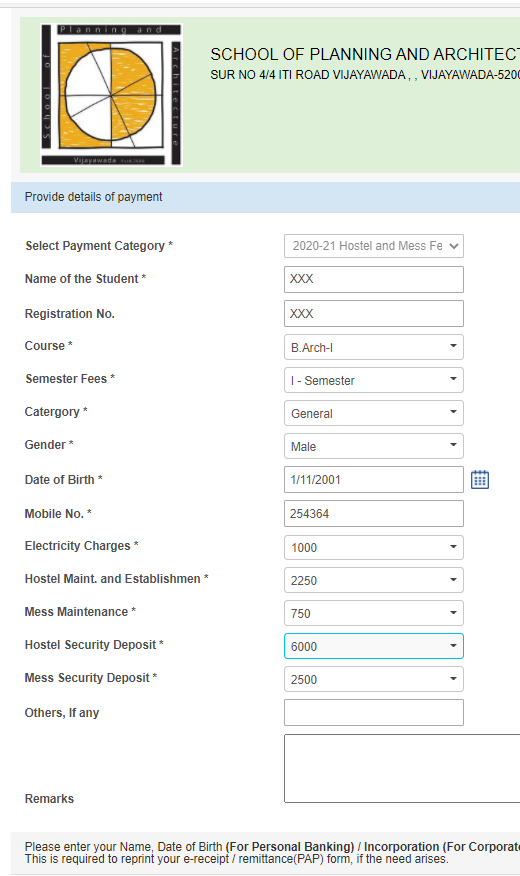| Name of the Programme | Bachelor of Architecture |
| Abbreviation | B.Arch |
| Year of Commencement | 2008 |
| Department | Architecture |
| Duration | Five Years |
| Semesters | Ten |
| Eligibility |
The admission to the Bachelor of Architecture and Bachelor of Planning courses is made on the basis of Joint Seat Allocation Authority (JOSAA 2020). The students have to qualify the basic requirements as per Central Seat Allocation Board (CSAB). The criteria for admission as per CSAB 2020. JOSAA 2020 | CSAB 2020 |
| Intake | 98 |
| Objective |
The key objective of the programme is to prepare the students for professional practice in the field of Architecture. Being an undergraduate programme, it has a broad scope, providing exposure to a variety of interests in this field and assisting students to discover their own directions for further development. The programme also aims at attaining a high level of excellence in Architectural Design. To this end, the design course is seen as the core of the programme with supportive inputs from courses in other streams viz., the Humanities, the Technological and the Professional, built upon a strong foundation of enabling skills in communications and data processing. The emphasis is on the development of faculties of discernment and decision-making with the aid of both objective information and subjective attitudes, based on reason. |
| Credits | 300 (@30 / semester) |
| Marks | 12000 (@1200/semester) |
| Name of the Programme | Bachelor of Planning |
| Abbreviation | B.Plan |
| Year of Commencement | 2008 |
| Department | Planning |
| Duration | Four Years |
| Semesters | Eight |
| Eligibility |
The admission to the Bachelor of Architecture and Bachelor of Planning courses is made on the basis of Joint Seat Allocation Authority (JOSAA 2020). The students have to qualify the basic requirements as per Central Seat Allocation Board (CSAB). The criteria for admission as per CSAB 2020. JOSAA 2020 | CSAB 2020 |
| Intake | 34 |
| Objective |
The key objective of the programme is to equip the students with the fundamentals aspects and specialized techniques of spatial planning in a comprehensive manner that ranges from neighbourhood to regional planning. The curriculum is designed to impart basic skills related to settlement patterns, growth and design, that would help students later in their careers to serve in various professional capacities in planning, development and management agencies in the public sector as well as private consultancy organizations. The aim of the programme is multi-disciplinary in nature - drawing from the field of city planning, blending the knowledge from architecture, engineering, geography, economics, sociology, management, law, etc. During the programme, the students are equipped with the knowledge of basic theories, techniques, and design concepts from mainstream of town and country planning. Adequate emphasis is given to practicals / lab oriented design exercises, where the students have opportunity of learning by doing. |
| Credits | 240 (@30 / semester) |
| Marks | 8000 (@1000/semester) |
| Name of the Programme | Master of Architecture (Sustainable Architecture) |
| Abbreviation | M.Arch (SA) |
| Year of Commencement | 2014 |
| Department | Architecture |
| Duration | Two Years |
| Semesters | Four |
| Eligibility |
B.Arch. |
| Intake | 20 |
| Objective |
The key objective of the programme is to to develop skills,
knowledge and understanding related to environmental
sustainability, construction and building technology, adopting
the principles and practices of sustainable building design,
while responding to environmental challenges such as Climate
change, environmental degradation etc. |
| Credits | 120 (@30 / semester) |
| Marks | 4000 (@1000/semester) |
| Name of the Programme | Master of Architecture (Landscape Architecture) |
| Abbreviation | M.Arch (LA) |
| Year of Commencement | 2018 |
| Department | Architecture |
| Duration | Two Years |
| Semesters | Four |
| Eligibility |
B.Arch. |
| Intake | 20 |
| Objective |
The key objective of the programme is to develop an overall understanding of the landscape design and its related aspects such as history of landscape architecture, contemporary landscapes, environmental / ecological issues, geological / drainage patterns, watershed, hydrological principles, etc. Besides, the curriculum also deals with natural, cultural, and social systems that affect the design decisions, as well as the language and literature of landscape architecture. |
| Credits | 120 (@30 / semester) |
| Marks | 4000 (@1000/semester) |
| Name of the Programme | Master of Architecture (Architectural Conservation) [Self-Financing Course] |
| Abbreviation | M.Arch (AC) |
| Year of Commencement | 2019 |
| Department | Architecture |
| Duration | Two Years |
| Semesters | Four |
| Eligibility |
B.Arch. |
| Intake | 20 |
| Objective |
The key objective of the programme is to develop a deeper
understanding of this cultural phenomenon and its association
with integral development of the settlements. A comprehensive
and integrated conservation management and to equip the
students with adequate skills required to comprehend various
aspects that are the determinants of the heritage in all the
contexts. |
| Credits | 120 (@30 / semester) |
| Marks | 4000 (@1000/semester) |
| Name of the Programme | Master of Building Engineering and Management (Self-Financing Course) |
| Abbreviation | MBEM |
| Year of Commencement | 2019 |
| Department | Architecture |
| Duration | Two Years |
| Semesters | Four |
| Eligibility |
B.Arch / B.E. or B.Tech (Civil Engineering or Building &
Construction Technology or Construction Technology or Construction
Technology & Management). |
| Intake | 20 |
| Objective |
This programme enables the students in acquiring knowledge in state of art construction techniques and other related topics such as Materials, Construction finance, Quality management, Contracting, safety and legal issues, Value engineering, Organization, Human resource management, Advanced technologies and Operational Research. It emphasizes the importance of today’s construction needs for a rewarding management career in infrastructure Construction Industry. |
| Credits | 120 (@30 / semester) |
| Marks | 4000 (@1000/semester |
| Name of the Programme | Master of Planning ( Environmental Planning and Management) |
| Abbreviation | M.Plan (EPM) |
| Year of Commencement | 2013 |
| Department | Planning |
| Duration | Two Years |
| Semesters | Four |
| Eligibility |
B.Planning / B.Arch / B.Tech (Planning or Civil Engineering) /
B.E. (Civil Engineering) / Master’s Degree in Geography or
Economics or Sociology. |
| Intake | 20 |
| Objective |
The overall objective of the programme is to rationally sensitise the students towards the intricate ecological relationship between nature and human settlements and thereby equip them with adequate skills required to comprehend, analyse and plan for urban and regional issues with the pretext of maintaining ecological balance. This broad aim intrinsically shall involve comprehension of physical, socio-economic, cultural, political and ecological dimensions of the human settlements. It shall focus particularly in recording and interpreting environmental resource baseline and their local and regional capacities to deal with human needs. |
| Credits | 120 (@30 / semester) |
| Marks | 4000 (@1000/semester) |
| Name of the Programme | Master of Planning (Urban and Regional Planning) |
| Abbreviation | M.Plan (URP |
| Year of Commencement | 2014 |
| Department | Planning |
| Duration | Two Years |
| Semesters | Four |
| Eligibility |
B.Planning / B.Arch / B.Tech (Planning or Civil Engineering) /
B.E. (Civil Engineering) / Master’s Degree in Geography or
Economics or Sociology. |
| Intake | 20 |
| Objective |
The key objective of the programme is to equip the students with adequate skills required to comprehend urban and regional issues and to analyse physical, socio-economic, cultural, political and ecological dimensions of the human settlements. The course is designed to provide necessary exposure to various planning processes, emerging trends and other related advanced technical knowhow. It intends to contribute towards the creation of professionals in the field and hence to cater to the specific needs of the industry and academics. During the course, the students will be provided with ample opportunities to interact with the subject experts, relevant organisations, etc. The course enables the students to gain real time experience through their involvement in the ongoing or live projects. |
| Credits | 120 (@30 / semester) |
| Marks | 4000 (@1000/semester) |
| Name of the Programme | Master of Planning (Transportation& Infrastructure Planning) |
| Abbreviation | M.Plan (TIP) |
| Year of Commencement | 2018 |
| Department | Planning |
| Duration | Two Years |
| Semesters | Four |
| Eligibility |
B.Planning / B.Arch / B.E. or B.Tech (Planning or Civil
Engineering) / Master’s Degree in Economics or Statistics or
Operations Research. |
| Intake | 20 |
| Objective |
The key objective of the programme is to equip the students with adequate skills required to comprehend transportation and infrastructure related issues. The programme focuses on various key aspects such as urban transportation, public transportation, highway planning, smart mobility, logistics and freight distribution, etc. |
| Credits | 120 (@30 / semester) |
| Marks | 4000 (@1000/semester) |
 Instructions to the
students for Online Reporting of UG Programmes (JOSAA / DASA & CSAB)
Instructions to the
students for Online Reporting of UG Programmes (JOSAA / DASA & CSAB) Instructions
to
UG
Students for online Reporting (JoSAA/DASA-2021)
Instructions
to
UG
Students for online Reporting (JoSAA/DASA-2021) JOSAA/CSAB guidelines for Students, who are admitting
into SPA
Vijayawada
JOSAA/CSAB guidelines for Students, who are admitting
into SPA
Vijayawada
As per the JOSAA/CSAB guidelines,
Students, who are admitting into SPA Vijayawada, will report ONLINE during November 20 – 24,
2021 instead
of physical
reporting through JoSAA Portal only.
Further details please find below links:
https://josaa.nic.in/
https://csab.nic.in/
Information regarding DASA2021 UG Admission:
 Mode of Reporting: Online mode (as per prevailing Covid-19
directives)
Mode of Reporting: Online mode (as per prevailing Covid-19
directives)
 Date of commencement of classes: Will be finalized according to
the JOSAA
schedule and will be declared later.
Date of commencement of classes: Will be finalized according to
the JOSAA
schedule and will be declared later.
 Format of Medical Certificate (if any): Medical certificate will be as per JOSAA format
given at View
(josaa.nic.in)
Format of Medical Certificate (if any): Medical certificate will be as per JOSAA format
given at View
(josaa.nic.in)
 The e-Mail id for further communication: admissions@spav.ac.in,
academics@spav.ac.in, krishnakumar.sv@spav.ac.in
The e-Mail id for further communication: admissions@spav.ac.in,
academics@spav.ac.in, krishnakumar.sv@spav.ac.in
 Direct
Admissions - Instructions
for Reporting PG Students
Direct
Admissions - Instructions
for Reporting PG Students
 CCMT-Instruction
for Reporting of PG Students
CCMT-Instruction
for Reporting of PG Students
 WEB
NOTICE- I Year PG
Program students
WEB
NOTICE- I Year PG
Program students
 PG-Provisionally Eligible
Candidates for
Stage-III
PG-Provisionally Eligible
Candidates for
Stage-III
 Provisionally Selected
Candidates (Round-II)
through the PG Direct Admissions (2021-22).
Provisionally Selected
Candidates (Round-II)
through the PG Direct Admissions (2021-22).
 Instructions to the provisionally selected candidates through the PG Direct
Admissions
(2021-22).
Instructions to the provisionally selected candidates through the PG Direct
Admissions
(2021-22).
Doctoral Programme through Direct Admission for the acedemic year 2021-22
DoA-PhD-Provisionally Eligible Candidates for Stage-II

DoP-PhD-Provisionally Eligible Candidates for Stage-II

Instructions to the provisionally selected candidates for the Master’s Programme through Direct Admissions at SPA Vijayawada for the Academic Year 2021-22

PG Direct Admissions (2021-22)-Results
 PG-Provisionally Selected Candidates
(Round-IV)
PG-Provisionally Selected Candidates
(Round-IV)
 Master of Architectural
Conservation-MAC
Master of Architectural
Conservation-MAC
 Master of Landscape Architecture-MLA
Master of Landscape Architecture-MLA
 Master of Architecture (Sustainable Architecture)-MSA
Master of Architecture (Sustainable Architecture)-MSA
 Master of Building Engineering and
Management-MBEM
Master of Building Engineering and
Management-MBEM
 Master of Planning (Transport Planning)-MTP
Master of Planning (Transport Planning)-MTP
 Master of Planning (Urban and Regional Planning)-MURP
Master of Planning (Urban and Regional Planning)-MURP
 Master of Planning (Environmental Planning and Management)-MEPM
Master of Planning (Environmental Planning and Management)-MEPM
Web Notice-Online entrance test(written) for the direct admissions to the Doctoral Programme for the Academic Year 2021-22
Web Notice
Corrigendum
Doctoral Programme Eligibility list AY 2021-22
Master's Programme Final Eligibilty list AY 2021-22
Doctoral & PG Programme (Direct Admissions)
Reporting Instructions to PhD candidates for the A.Y. 2021-22.

Ph.D. Direct Admissions - Web Notice for Online Interviews

Web Notice for PG & Doctoral Programme Eligibility list and Entrance examination for the A.Y 2021-22
Notification for Doctoral & PG Programme through Direct Admissions for AY 2021-22
Application form for Doctoral Programme AY 2021-22
Application form for PG Programme AY 2021-22
Doctoral & PG Programme (Sponsored Category)
Notification for Doctoral & PG Programmes Admissions under Sponsored Category for AY 2021-22
Application form for Doctoral Programme under Sponsored Category AY 2021-22
Application form for PG Programme under Sponsored Category AY 2021-22
Certificates
Revised EWS Certificate Format
OBC Certificate Format
Course Completion Certificate format.pdf
Syllabus
Syllabus for Doctoral Programme Entrance Examination AY 2021-22
Syllabus for PG Programme Entrance Examination AY 2021-22
DIRECTIONS FOR PAYMENT OF APPLICATION FEE THROUGH SBI COLLECT
1.Please visit SBI SB Collect website at url: https://www.onlinesbi.sbi/sbicollect/icollecthome.htm
2.Select the Check Box for accepting the SB Collect terms and conditions; Click the PROCEED Button
3.Select: ANDHRA PRADESH against “State of Corporate / Institution”
4. Select : EDUCATIONAL INSTITUTIONS against “Type of Corporate / Institution”
5.Select SCHOOL OF PLANNING AND ARCHITECTURE, VIJAYAWADA against “Educational Institutions Name”
6.Click the SUBMIT Button
7.Select APPLICATION FEE against “Select Payment Category”
8.Fill the details appropriately & click the SUBMIT Button
9.Check & ensure the details & click the CONFIRM Button
10.Select the relevant Payment method & complete the payment.
Note: Please enclose the application fee receipts along with the application.
Academics (Admissions/Fee related) - 0866 2469 493
MR. Shyam Kumar PVS - 8106210312
Mr. Bhanu Prakash - 0866 2469 493
How to pay fee through SBI collect (Template available below)
| General/OBC | SC/ST/PWD | Hostel & Mess |
|---|---|---|
 |
 |
 |
DASA Co-Ordinator – Mr. Venkata Krishna Kumar Sadhu (Associate Professor,DOA) Contact No. – +91 9490751501 Admissions for DASA 2021-22 onwards, will be based on JEE main ranks |


